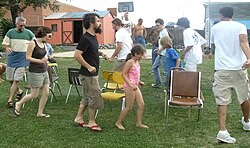Pulling Out Chair Drawing Reference
Elimination genre party game
"Trip to Jerusalem" redirects here. For the public house in Nottingham, see Ye Olde Trip to Jerusalem.
 Musical chairs being played at a party | |
| Players | Variable |
|---|---|
| Setup time | Variable |
| Playing time | Variable |
| Random chance | Music stoppage may seem random to players, but is under the control of the leader |
| Age range | Usually children |
| Skills required | Quick reaction time |
Musical chairs, also known as Trip to Jerusalem, is a game of elimination involving players, chairs, and music. It is a staple of many parties worldwide.
Gameplay [edit]
A set of chairs is arranged with one fewer chair than the number of players (for example, seven players would use six chairs). While music plays, the contestants walk around the set of chairs. When the music stops abruptly, all players must find their own individual chair to occupy. The player who fails to sit on a chair is eliminated.[1] A chair is then removed for the next round, and the process repeats until only one player remains and is declared the winner.
In Wales, musical chairs had a similar custom to the modern version, with slight differences; the boys would always sit whilst the girls would skip around, always outnumbering the boys, if the a girl didn't sit fast enough on the boy's lap, she would have to forfeit, this would continue until the end when the winning girl would kiss the last boy on the cheek.[2]
History of the name [edit]
The origins of the game's name as "Trip to Jerusalem" is disputed. However, it is known to come from its German name Reise Nach Jerusalem ("The Journey to Jerusalem"). One theory suggests that the name was inspired by the Crusades, wherein several heavy losses were incurred. Another theory suggests that it was inspired by the Aliyah, the immigration of Jews from the diaspora to the Land of Israel (which includes the modern State of Israel), wherein it is stated that spaces on ships taking the Jews to the said land were limited. None of these theories were officially confirmed.
As metaphor [edit]
The term "playing musical chairs" is also a metaphor for describing any activity where items or people are repeatedly and usually pointlessly shuffled among various locations or positions. It can also refer to a condition where people have to expend time searching for a resource, such as having to travel from one gasoline station to another when there is a shortage. It may also refer to political situations where one leader replaces another, only to be rapidly replaced due to the instability of the governing system (see cabinet reshuffle).
In popular culture [edit]
In the musical Evita, during the song "The Art of the Possible", Juan Perón and a group of other military officers play a game of musical chairs which Perón wins, symbolizing his rise to power.
In the historical drama Dara of Jasenovac, prisoners of the Jasenovac concentration camp are forced to play a game of musical chairs by the Ustasha guards who execute the losers to entertain the visiting Nazi officials.
See also [edit]
- Buggins' turn
- Chinese fire drill
- Level-coil
- Musical statues
References [edit]
- ^ Orlick, Terry (2006). "No-Elimination Games". Cooperative Games and Sports: Joyful Activities for Everyone. Human Kinetics. p. 21. ISBN9780736057974.
- ^ "Watch Dyma'r Urdd".
Pulling Out Chair Drawing Reference
Source: https://en.wikipedia.org/wiki/Musical_chairs